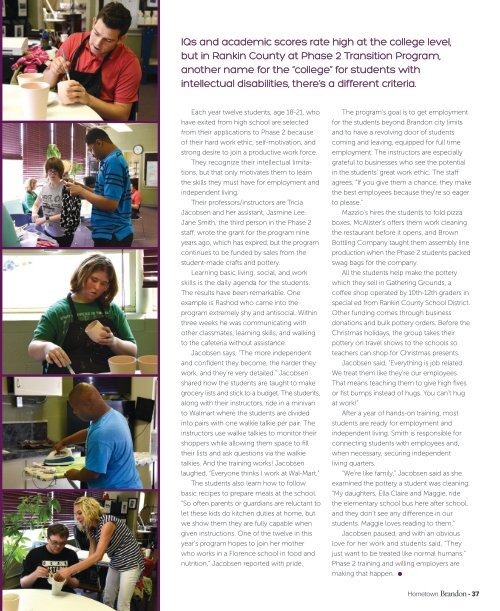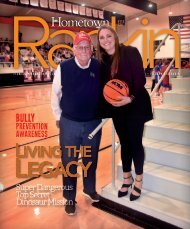You also want an ePaper? Increase the reach of your titles
YUMPU automatically turns print PDFs into web optimized ePapers that Google loves.
IQs and academic scores rate high at the college level,<br />
but in Rankin County at Phase 2 Transition Program,<br />
another name for the “college” for students with<br />
intellectual disabilities, there’s a different criteria.<br />
Each year twelve students, age 18-21, who<br />
have exited from high school are selected<br />
from their applications to Phase 2 because<br />
of their hard work ethic, self-motivation, and<br />
strong desire to join a productive work force.<br />
They recognize their intellectual limitations,<br />
but that only motivates them to learn<br />
the skills they must have for employment and<br />
independent living.<br />
Their professors/instructors are Tricia<br />
Jacobsen and her assistant, Jasmine Lee.<br />
Jane Smith, the third person in the Phase 2<br />
staff, wrote the grant for the program nine<br />
years ago, which has expired, but the program<br />
continues to be funded by sales from the<br />
student-made crafts and pottery.<br />
Learning basic living, social, and work<br />
skills is the daily agenda for the students.<br />
The results have been remarkable. One<br />
example is Rashod who came into the<br />
program extremely shy and antisocial. Within<br />
three weeks he was communicating with<br />
other classmates, learning skills, and walking<br />
to the cafeteria without assistance.<br />
Jacobsen says, “The more independent<br />
and confident they become, the harder they<br />
work, and they’re very detailed.” Jacobsen<br />
shared how the students are taught to make<br />
grocery lists and stick to a budget. The students,<br />
along with their instructors, ride in a minivan<br />
to Walmart where the students are divided<br />
into pairs with one walkie talkie per pair. The<br />
instructors use walkie talkies to monitor their<br />
shoppers while allowing them space to fill<br />
their lists and ask questions via the walkie<br />
talkies. And the training works! Jacobsen<br />
laughed, “Everyone thinks I work at Wal-Mart.”<br />
The students also learn how to follow<br />
basic recipes to prepare meals at the school.<br />
“So often parents or guardians are reluctant to<br />
let these kids do kitchen duties at home, but<br />
we show them they are fully capable when<br />
given instructions. One of the twelve in this<br />
year’s program hopes to join her mother<br />
who works in a Florence school in food and<br />
nutrition,” Jacobsen reported with pride.<br />
The program’s goal is to get employment<br />
for the students beyond Brandon city limits<br />
and to have a revolving door of students<br />
coming and leaving, equipped for full time<br />
employment. The instructors are especially<br />
grateful to businesses who see the potential<br />
in the students’ great work ethic. The staff<br />
agrees, “If you give them a chance, they make<br />
the best employees because they’re so eager<br />
to please.”<br />
Mazzio’s hires the students to fold pizza<br />
boxes, McAlister’s offers them work cleaning<br />
the restaurant before it opens, and Brown<br />
Bottling Company taught them assembly line<br />
production when the Phase 2 students packed<br />
swag bags for the company.<br />
All the students help make the pottery<br />
which they sell in Gathering Grounds, a<br />
coffee shop operated by 10th-12th graders in<br />
special ed from Rankin County School District.<br />
Other funding comes through business<br />
donations and bulk pottery orders. Before the<br />
Christmas holidays, the group takes their<br />
pottery on travel shows to the schools so<br />
teachers can shop for Christmas presents.<br />
Jacobsen said, “Everything is job related.<br />
We treat them like they’re our employees.<br />
That means teaching them to give high fives<br />
or fist bumps instead of hugs. You can’t hug<br />
at work!”<br />
After a year of hands-on training, most<br />
students are ready for employment and<br />
independent living. Smith is responsible for<br />
connecting students with employees and,<br />
when necessary, securing independent<br />
living quarters.<br />
“We’re like family,” Jacobsen said as she<br />
examined the pottery a student was cleaning.<br />
“My daughters, Ella Claire and Maggie, ride<br />
the elementary school bus here after school,<br />
and they don’t see any difference in our<br />
students. Maggie loves reading to them.”<br />
Jacobsen paused, and with an obvious<br />
love for her work and students said, “They<br />
just want to be treated like normal humans.”<br />
Phase 2 training and willing employers are<br />
making that happen. l<br />
Hometown Brandon • 37

















